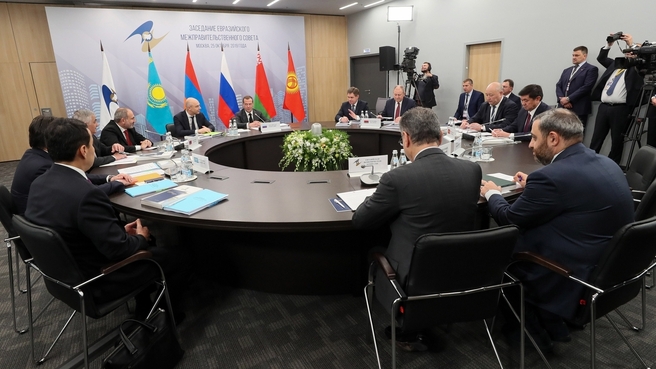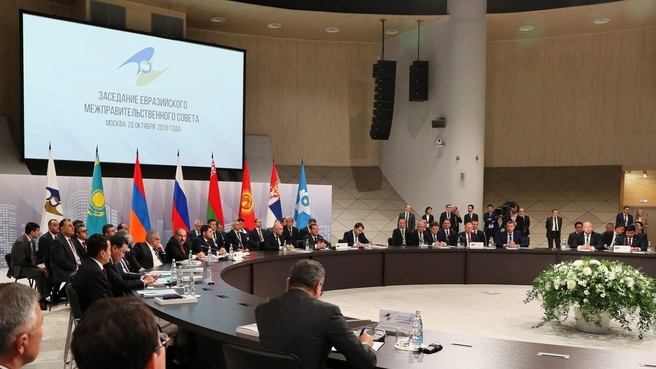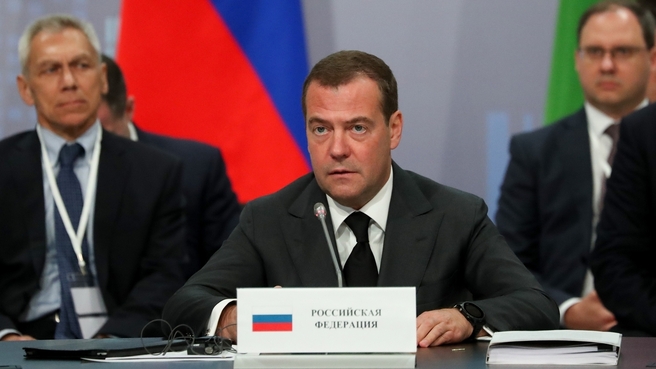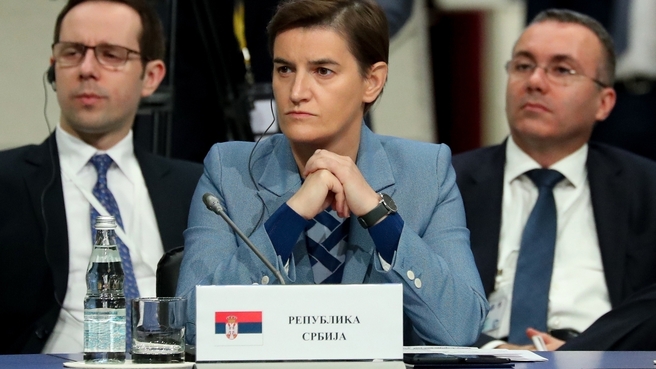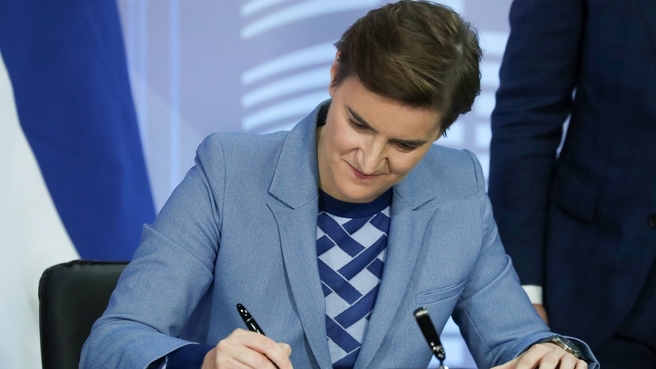Cooperation within the framework of the digital agenda and the interaction of countries in the areas of veterinary and the agro-industrial complex at the Eurasian Economic Union were the topics discussed.
Dmitry Medvedev’s remarks at the meeting
Documents signed following the meeting
List of delegation heads attending the meeting of the Eurasian Intergovernmental Council:
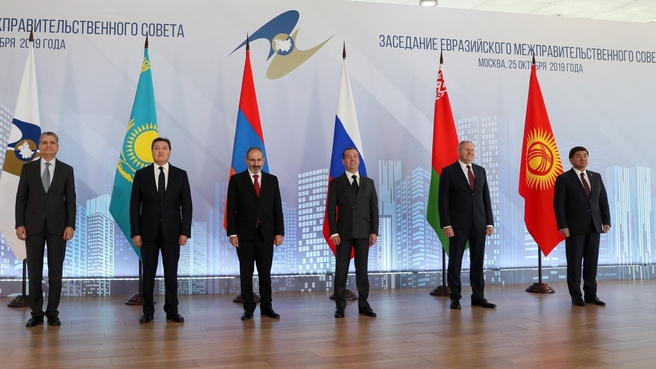
Group photo of the heads of delegations taking part in the Eurasian Intergovernmental Council meeting
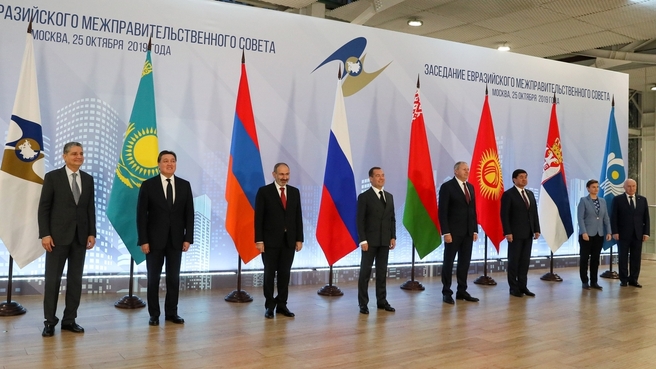
Group photo of the heads of delegations taking part in the expanded meeting of the Eurasian Intergovernmental Council

Dmitry Medvedev and Prime Minister of the Republic of Armenia Nikol Pashinyan at the signing ceremony of an agreement on a free trade area between the Eurasian Economic Union and Serbia
Group photo of the heads of delegations taking part in the Eurasian Intergovernmental Council meeting
Prime Minister of the Republic of Armenia Nikol Pashinyan;
Prime Minister of the Republic of Belarus Sergei Roumas;
Prime Minister of the Republic of Kazakhstan Askar Mamin;
Prime Minister of the Kyrgyz Republic Mukhammedkalyi Abylgaziyev;
Prime Minister of the Russian Federation Dmitry Medvedev;
Chairman of the Board of the Eurasian Economic Commission Tigran Sargsyan;
Prime Minister of the Republic of Serbia Ana Brnabic;
Chairman of the Executive Committee, Executive Secretary of the Commonwealth of Independent States Sergei Lebedev.
Dmitry Medvedev’s remarks at the meeting:
Good afternoon, colleagues and our chairman, Mr Pashinyan!
I would like to welcome all the meeting participants, all the delegation members once again. We reviewed a number of issues in the restricted-attendance meeting, including the elaboration of union documents, and exchanged opinions on further steps. This is our fourth meeting this year. We need to meet regularly given our busy agenda.
We consider it our priority to deepen Eurasian integration, improve the functioning of the EAEU’s common market and ensure the sustainable development of its five members. As before, Russia is willing to actively facilitate achieving these goals. Supranational regulation in the EAEU should be primarily felt by the residents of our countries. It should improve their living standards and create a common space for self-realisation with equal opportunities, where they will be able to receive education, do business and build a career regardless of their place of birth and nationality.
In general, Eurasian economic integration is making steady headway. We are striving to unleash the union’s potential and taking steps to encourage business and economic growth. The economic indicators of its members are fairly good. The aggregate gross product, as well as industrial and agricultural production, is on the rise. At the same time, we must promote the growth of our mutual trade as well as the five member countries’ foreign trade in all groups of commodities.
This task involves the efforts of the Eurasian Economic Commission (EEC), which could analyse the trade of the union’s members and suggest ways to build it up.
I would like to discuss some areas of work in more detail. First, we need to consolidate integration from within and upgrade supranational regulation. We make practical decisions on new markets of commodities and ensure their free movement within the entire EAEU. We make sure our rules are transparent and understandable.
As for the existing barriers to the free movement of goods, services, capital and labour, this issue is always topical. It is really important, and we remove these barriers using our roadmap. Let me recall that initially we identified 56 barriers and eliminated two-thirds of them – 36 barriers. This is a good pace, but the sooner we remove all of them, the faster we will move forward. I am sure all five countries realise this, will adopt a constructive approach to this issue, and will find mutually acceptable solutions.
We look forward to active joint work on creating a common financial market. The countries’ leaders have already approved the concept for its formation. It is necessary to begin to implement the agreements reached.
Today we discussed complicated issues at the restricted-attendance meeting, including alcohol market regulation. Common rules in this area will not only remove the existing barriers to mutual trade in alcohol but will also make it possible to more effectively monitor its quality and safety. I hope that we will be able to accomplish everything that we agreed on today at the restricted-attendance meeting.
We should also pay attention to trade in precious metals and stones, as well as their exports. The signing of an international agreement on the specifics of operations with them within the EAEU will be one of the main stages of work to promote union-produced jewellery and will ensure mutual recognition of assay marks, which is really important. And that will remove another barrier between our countries.
Another thing is the development of cooperation in industry and agriculture. An important document, an important step in this respect will be an agreement on a coordinated policy in livestock breeding, in order to increase the production and mutual supply of livestock products, and in some cases – simply to reduce dependence on imports in this area.
Another important topic is the improvement of technical regulation. We need to create an effective mechanism for monitoring the compliance with technical regulations, an effectively working information-sharing system. This is the only way to protect our people from bad, low-quality and counterfeit products. If we join our efforts, then our standards will comply with both international and regional standards.
We also need to increase the transparency of the movement of goods across the Union. This is also connected with our efforts to fight counterfeit products, to do away with the shadow market. In this respect a really important topic is the marking of goods. I have already spoken about this several times. Of course, we need to create a universal system of traceability and marking, which, wherever a product is located, would allow us to determine where it came from, from which batch, how it got to a particular country, and its exact location, and therefore, to monitor all flows of goods and understand where there are bottlenecks.
Another promising area is digitalisation, modern technologies and solutions that will allow us to do away with excessive bureaucracy and will be a means of combating the black and grey markets. We are working hard on digitalisation. Our efforts should remain well coordinated in the future, so we have developed a procedure for cooperation between centres of competence. The document will simplify the examination of initiatives that exist in the digital field. I hope that it will be put into practice in the near future.
And we need to accelerate the launch of the so-called cross-border trust space, so that we can transition to a full-scale online exchange of legal documents throughout the Union.
In conclusion, I would like to say a few words about international cooperation.
First of all, I would like to welcome again Prime Minister of Serbia Ana Brnabic. I recently visited Belgrade, literally several days ago. We link mutually beneficial cooperation with today’s document, our free trade agreement between the EAEU and Serbia. Its signing will raise this cooperation to a new level. This is a momentous event in our trade and economic relations. We hope our trade will grow, first of all owing to lower import duties. Serbia will receive tangible benefits from the agreement with the Union. Its goods will enter the Union’s market on better terms than before. This market already has 183 million consumers, and the Union’s aggregate GDP approaches two trillion dollars. And, of course, the goods of the Union’s members will be better represented on the Serbian market and sold for reasonable prices.
The interest of our partners in expanding trade and economic ties with the five EAEU members is growing. The agreement on trade and economic cooperation between the EAEU and China enters into force today (it was signed on 17 May last year). We agreed with our Chinese partners to adopt a joint statement in this connection. We note our mutual desire to deepen our trade and economic cooperation. The agreement creates the necessary foundation for this. It will help us find new cooperation formats.
This is fully in line with our initiative to create the Greater Eurasian Partnership, which could unite the potential of the five EAEU members, the SCO and ASEAN, and other Asian and European states in the long-term.
We want our Union to be a full-fledged participant in global trade. The interim free trade zone agreement with Iran will enter into force in two days. We expect positive results from the agreement with Singapore, which was signed on 1 October. Talks with India, Egypt and Israel are underway. Literally a few days ago, the Eurasian Economic Commission and the African Union signed a memorandum of understanding at the Russia-Africa Summit. We will build our versatile ties with African countries on this foundation.
Naturally, we should promote our cooperation with the CIS neighbours. We support their interests and have just discussed the legal regulation of international agreements signed by the CIS and the EAEU. I believe our level of integration is higher, and we should strive to upgrade the level of integration within the CIS if other CIS countries agree to this. To sum up, the scale of international cooperation is impressive.
Some events evoke a negative reaction fairly often. Sometimes, this reaction is strange. Today, a US secretary said during his visit to Uzbekistan that cooperation between the EAEU and Uzbekistan will make it more difficult for Uzbekistan to join the WTO. Obviously, this is not fair play. It is all the more strange to hear such statements from representatives of the US administration that is doing everything to sow chaos in world trade, conducting trade wars and disrupting international trade. Apparently, our overseas colleagues are not very happy about our integration processes, the agreements that we sign and cooperation on our continent in general. But there is no doubt that we will continue this work with our partners in all areas.
Colleagues, I would like to emphasise once again that the geography of our association is expanding. Russia is willing to facilitate this in every possible way.
Documents signed following the meeting of Eurasian Intergovernmental Council:
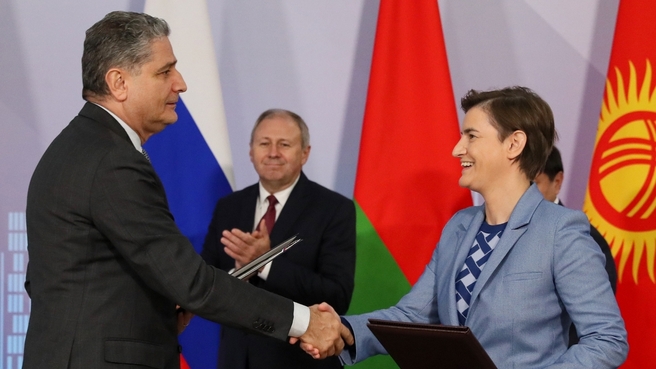
Chairman of the Board of the Eurasian Economic Commission Tigran Sargsyan and Prime Minister of the Republic of Serbia Ana Brnabic at the signing ceremony of an agreement on a free trade area between the Eurasian Economic Union and Serbia
Chairman of the Board of the Eurasian Economic Commission Tigran Sargsyan and Prime Minister of the Republic of Serbia Ana Brnabic at the signing ceremony of an agreement on a free trade area between the Eurasian Economic Union and Serbia
Joint Statement on the coming into effect of the Agreement on Trade and Economic Cooperation Between the Eurasian Economic Union and Its Member States, on One Side, and the People’s Republic of China, on the Other Side, dated 17 May 2018
Agreement on the Free Trade Zone Between the Eurasian Economic Union and its Member States, on the One Side, and the Republic of Serbia, on the Other Side. The Agreement sets out the principal rules for trade between EAEU states and Serbia in compliance with the WTO norms; envisions a further liberalisation of trade in a limited range of goods; and contains new up-to-date provisions with account of the global practice of concluding free trade agreements.
Decision on the Approval of the Protocol of Cooperation between Competence Centres of the Eurasian Economic Union Member States and the Eurasian Economic Commission as part of the Implementation of the Union’s Digital Agenda
Agreement on Conducting
Transactions with Precious Metals and Precious Stones Within the Eurasian
Economic Union
The signed agreement lifts a restriction in the domestic jewellery
market of the Union related to the lack of mutual recognition of plate marks in
jewellery trade, and sets conditions for free trade in precious metals, precious
stones and jewellery in the Union’s domestic market. The Agreement outlines
legal grounds and standards for operations on the domestic market with precious
metals, precious stones and jewellery in the Union and also authorises the
Eurasian Economic Commission to approve acts envisioned by a draft
international treaty.
Resolution on the Action Plan to
Promote Jewellery Products of the Eurasian Economic Union member states on
third countries’ markets
The Eurasian Intergovernmental Commission’s resolution approves an
action plan to promote jewellery products made in the EAEU countries on international
markets. The plan includes creating an institutional environment and
infrastructure for the development of the jewellery industry and ensuring
exports of jewellery products.
Agreement on Measures to
Standardise Livestock Selection and Breeding within the Eurasian Economic Union
The Agreement requires the use of unified standards for livestock
selection and breeding in the member countries, including by applying unified standards
for pedigree stock breeding within the Union.
Decision on Certain Aspects of the Use of the Term “Authorised Representative of the Producer” regarding persons authorised by foreign producers
Resolution on the Time and Venue for Holding the Next Meeting of the Eurasian Intergovernmental Council
A number of other instructions were also adopted.
